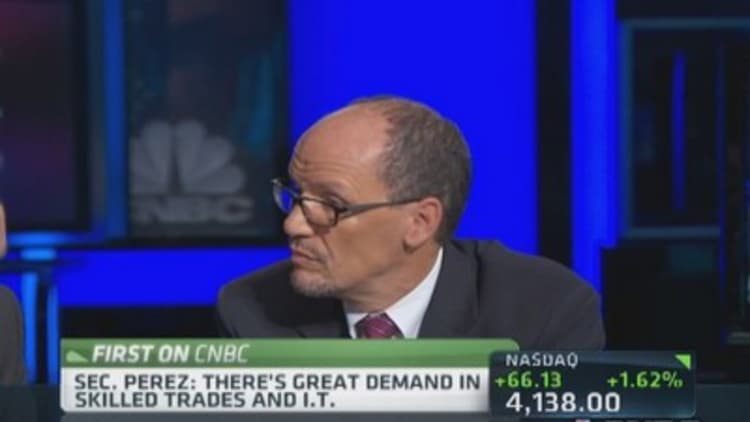
They have backed efforts to address climate change, held countless fundraisers for local causes and been staunch supporters of progressive political candidates including President Barack Obama—but one thing they can't fully get behind is the push for a swift and sharp increase in the minimum wage.
Some small-business owners in liberal-leaning cities such as Seattle and San Francisco are finding themselves in a conundrum when it comes to the latest hot-button political issue: Philosophically, they may agree with the concept of boosting the minimum wage significantly, but pragmatically, they worry any drastic mandate could put them out of business.
"We do have to do something in this country about the disparity between minimum wage and living wage," said Seattle restaurateur Tom Douglas. Douglas serves on the board of directors of a local food bank, and recently hosted a fundraiser for victims of the nearby Oso landslide.
But Douglas said he's already learned the hard way that he simply can't afford to raise base wages quickly for his approximately 800 workers—and especially his employees, who pocket tips—to a minimum of $15 an hour, as is being proposed in Seattle.
For businesses accustomed to aligning with their liberal customers' beliefs on issues such as buying locally grown ingredients or composting food waste, the wage debate can feel like they are being stretched in two directions.
"A lot of small businesses are scared to come at it because of the backlash," said Judith Gille, the founder and co-owner of City People's Mercantile, a 35-year-old local Seattle retailer.
Speak out against the popular measures to increase pay, and businesses risk alienating customers and even employees. Stay silent, and some worry the high costs could push them out of business.
"We just want people to understand the reality: That small businesses are working on small margins, that this will have a huge impact and, in some instances, if (the minimum wage) was raised too quickly, some businesses would go out of business," said Hut Landon, executive director of the San Francisco Locally Owned Merchant Alliance.
In San Francisco, long known for its progressive stances, labor leaders are pushing proposals to raise the minimum wage to $15 in the coming years, up nearly 40 percent from $10.74 currently. San Francisco Mayor Ed Lee also has said he would support some sort of increase in the city's minimum wage.
In Seattle, another left-leaning city known for its strong commitment to things such as composting and bike lanes, the city's newly elected Socialist city council member, Kshama Sawant, has made it her mission to raise the minimum wage to $15 immediately for big businesses, and over a few years for smaller ones. That's a roughly 60 percent increase from the current statewide rate of $9.32.
The wage increase also has the support of Seattle Mayor Ed Murray, although his plan calls for a longer phase-in period and more credits toward that wage for things such as tips and health-care coverage.
Both Seattle proposals gives smaller-business owners a longer time to reach the threshold, but some argue that's not much help because they have to compete for workers with larger businesses, which will then be offering higher wages.
Minimum wage increases are opposed by the large industry lobbying groups, including the National Retail Federation and the National Restaurant Association. But many local business owners in these cities say they are taking a more nuanced stand.
Both Gille and Douglas say they support the stymied effort to increase the federal minimum wage to $10.10 an hour, from $7.25 currently. Both also would support a plan to gradually raise wages to $15 an hour over a period of years, along with a plan to count factors such as tips and health-care benefits toward that compensation amount.
"I'm all for raising the minimum wage," Gille said. "I'm not for going to $15 an hour on January 1."
'We were flat lining'
Douglas, an award-winning restaurateur whose Seattle restaurants include Dahlia Lounge, Etta's and Palace Kitchen, knows how hard it is to raise wages significantly and stay profitable because he already gave it a try, late last summer.
That's when he decided to give raises to all of his back-of-the-house workers, including cooks, prep cooks and dishwashers, without raising prices. The starting salaries for dishwashers were bumped to $12 an hour from $10 an hour, prep cooks went to $13 from $12 an hour and cooks went to $15 an hour from $13. The company also offers health-care benefits, vacation and sick time and free staff meals.
He expected the move to cost $1.2 million annually. Instead, he said it started looking like it would cost about $1.7 million, once other costs were taken into account, such as the need to give raises to workers higher up the ladder.
That eradicated his slim profit margin, which averages around 5 percent annually before taxes and reinvestment, and forced Douglas to forgo his own salary because cash flow got too tight.
"We were flat lining," he said.
Douglas ended up having to roll back entry-level salaries for dishwashers and prep cooks, with the understanding that they will be bumped up to those higher wage levels after a training period of up to six months.
In January, he also raised prices slightly more than usual, in part to account for the higher wages.
Despite the increased costs, Douglas said he would support moving the minimum wage to $15 an hour gradually. But to make it work without raising menu prices drastically, he says the plan would have to include some provision to count his servers' tips toward that $15 minimum.
The federal minimum wage for tipped workers is $2.13 an hour, but Washington state already requires employers pay tipped workers the full minimum wage of $9.32 an hour.
'Survival of my business'

The proposal to raise minimum wages to $15 an hour would have a substantial effect on Seattle workers and businesses. An analysis by economists at the University of Washington found that about 100,000 people working in Seattle earn less than $15 per hour, or about one-fourth of the city's workforce.
That includes entry-level workers at City People's, the mercantile and garden stores Gille co-owns.
New employees start at $11 to $11.50 an hour, along with a medical and dental plan, 16 days of paid leave and profit sharing that can add up to an additional $1 to $2 per hour.
Gille—who started the business 35 years ago as a collective—supports raising pay for low-wage workers, slowly over time. But as a business owner running a retailer with an average 4 percent profit margin and flat sales, she says there's no way she could immediately go up to $15 an hour without cutting benefits and raising prices.
That's a dicey gamble, because she already faces stiff competition from online retailers, which often undercut her on price.
"I'm trying to look at the survival of my business," Gille said. "I've got 85 people who like their jobs and want to keep them."
'If I can do it …'
Not every Seattle business owner has reservations about Seattle's "$15 Now" effort.
"I want to be the test case," said Molly Moon Neitzel, who owns the six-shop Seattle ice cream chain Molly Moon's. "We are the cutting edge."
Neitzel said all of her back-of-house workers have been earning at least $15 an hour since last fall, and her front-end workers make that much when tips are added in. She also offers health- care benefits and paid sick leave.
Neitzel said she started her 70-employee business six years ago in part because she wanted to see if a company could practice really progressive values and still be profitable. She now has profit margins of between 15 and 20 percent, and she thinks her experience shows that bigger businesses also can afford higher wages.
"If I can do it and make it work, and I'm a small business, then these big companies can definitely do it," she said.
—CNBC's Allison Linn.





